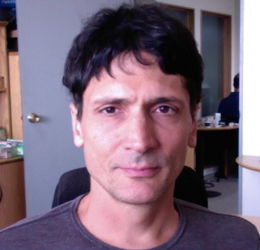Physicists and astronomers earn funds to study the formation of planets
Friday, 23 December 2016
 Simón Casassus Astrónomo - DAS y Director del MAD en ALMA |
With an economic contribution of 199 million pesos (CLP), obtained through the fund Quimal of CONICYT, scientists from the Department of Physics (DFI) and Astronomy (DAS) of the FCFM at Universidad de Chile prepare to start a scientific project.
The scientific team is led by the Director of the Department of Physics (DFI) Nicolás Mujica and is composed of the professors of DFI: Marcos Flores and Rodrigo Soto and the professor of the Department of Astronomy, Simon Casassus.
The winning project
The research "Experimental Astrophysical Research in Terrestrial Growth (EARTH)" investigates the formation of planets from the point of view of granular physics. So far there is no complete understanding of how the planets are formed from dust grains found in space, "explains Dr. Mujica.
The research has three specific objectives:
- Construct a free-fall experiment in a vacuum, where grain collisions are studied and It will be measured what is known as sticking efficiency under different experimental conditions.
- Construct an acoustic levitation trap experiment where it is placed in controlled form lumps of many grains, also studying the efficiency of these processes.
- Run numerical simulations where experimental results are used as input parameters.
A multidisciplinary team
The first of them is the astronomer DAS and Director of The Protoplanetary Disks Milennium Scientific Iniciative Nucleus, Simón Casassus, who indicates that its function will be unite different visions. "I serve to spotlight the synergy between the two areas, experimental physics and exoplanetary sciences. We want to understand the astrophysics of the birth of rocky planets through experiments that aim to reproduce in the laboratory key stages of grain to rock growth," He adds.
Marcos Flores, Doctor in Physics and expert in nanotechnology to contribute in the experiments of zero gravity in conditions of high vacuum says that "I will contribute in developing simulations of spatial conditions that would occur during the processes of the conformation of the planets where the stellar dust plays a particularly relevant role".
The physicist Rodrigo Soto focused on the study of granular media, "to analyze the agglomeration and dynamics of collisions of these grains and in the development of statistical methods to describe those shocks," he concludes.
Finally, Dr. Mujica indicates that they will have the collaboration of two young foreign researchers, Scott Waitukaitis, of the Leiden Institute of Physics, "who will help us in the design and construction of experimental assembly"; And Devin Shrader of the Center for Meteorology Studies at Arizona State University, who "will provide us with granular material obtained from meteorites, to be used in the levitation experiment," concludes the DFI scientist.




